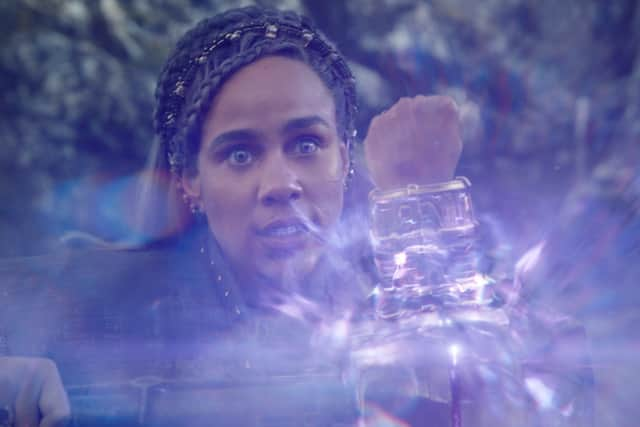Marvel Studios: MCU in trouble as The Marvels bombs at box office and Jonathan Majors saga continues
and live on Freeview channel 276
Marvel Studios continues to face problems as latest MCU movie, The Marvels, opens to lowest box office weekend in the franchise’s history. The film grossed $47 million domestically over the weekend, less than half of what Iron Man, the first instalment in the long-running film series made, and far far below the loft heights that Avengers: Endgame achieved with a $357 million domestic opening just four years ago.
It’s not just a one-off either, no film since Endgame has made more than $200 million in its opening weekend, whilst Ant-Man and the Wasp: Quantumania mustered around half that, and Guardians of the Galaxy 3 managed $118 million.
Advertisement
Hide AdAdvertisement
Hide AdBy most metrics these are impressive numbers, but not by Marvel standards, and for a franchise that puts out films that regularly surpass a $200 million budget, new movies should be making around $500 million over their cinematic run to begin to really turn a profit.
So far, only two MCU films have recorded a loss - Black Widow, which was plagued with problems, and Eternals - but The Marvels could well join that list. But the real problem for the studio is that this trend of underperforming films could well continue as several major issues converge.


Why is Marvel Studios struggling?
One very simple reason is that fewer people are going to see Marvel movies. Now, the factors behind this are less clear. But I’m going to try and explain it with the Roman Empire as a case study. Partly, the problem is that the MCU hit an all time high with Endgame in 2019, a film that had been essentially set up over the previous 11 years, just as the Roman Empire peaked around the 2nd century AD.
Endgame also saw the end of two of Marvel’s biggest characters, Iron Man, and Captain America. Similarly Rome struggled in the aftermath as the long reign of one emperor was often followed by periods of civil war and instability.
Advertisement
Hide AdAdvertisement
Hide AdWith films focusing on lesser known and less popular heroes, like Ant-Man, Doctor Strange, and The Eternals, it’s harder for Marvel to reel audiences in. Another issue is superhero fatigue - it’s one thing to release a new film every year or two when each instalment is an event. But it’s very different when fans now expect at least one new release every six months.
In 2023 alone, three new movies and two new seasons on Disney+ have been released. Newcomers to the MCU now need to watch 33 movies and nine series on Disney+ to keep pace. And when each new project is now interconnected - The Marvels is a sequel to Captain Marvel, Ms. Marvel, and WandaVision - skipping the odd instalment means missing out on context. Suddenly being a Marvel fan is hard work. In the Roman context, expansion brought greater costs as defending the empire’s frontiers became harder, eventually, growth stopped and a gradual loss of provinces followed.


Another issue that has been raised with Marvel movies since Endgame is the noticeable drop in quality of special effects. Now this is hardly the fault of special effects teams who report being overworked and underpaid, but rather of the studios insistence on pumping out project after project, each one increasingly reliant on SFX, and rushing creators with tight deadlines. A Roman Empire metaphor doesn’t fit here so I’m just going to skip ahead.
Finally, the crucial problem coming inexorably at Marvel is one Jonathan Majors. The actor, who plays Kang in Ant-Man and the Wasp: Quantumania, and Loki, is awaiting trial for alleged assault and harassment against his ex-partner. He denies the charges but should he be found guilty then Marvel Studios really will be up against it.
Advertisement
Hide AdAdvertisement
Hide AdThis is because the next two Endgame level movies are both built around Majors’ character Kang being the primary villain, essentially filling the place of Thanos. It’s almost certain that Marvel would drop Majors if he were found guilty, leaving a whopping great question mark over the shape of future MCU movies.
The MCU would have to pivot entirely from its current course, or at the very least recast Kang, which could be difficult. But we can look to history for help. Rome underwent a major change under Julius Caesar with the beginning of the Empire. Whilst this meant an end to the Republic, the newly born Empire was set to become the greatest power on Earth for centuries to come.
Marvel can change its trajectory, but what the studio needs to do is slow down, spend time getting the quality up to standard rather than releasing a film every three months, and stop trying to recapture the magic of Endgame. If every new release is directly connected to three others, it becomes a lot harder for audiences to keep up, and when potential problems like a criminal trial involving a major Marvel star appear on the horizon, it is difficult to navigate around them.
Comment Guidelines
National World encourages reader discussion on our stories. User feedback, insights and back-and-forth exchanges add a rich layer of context to reporting. Please review our Community Guidelines before commenting.
